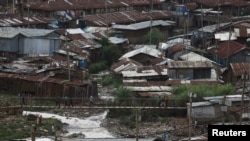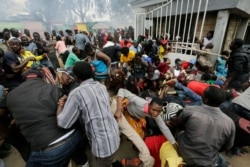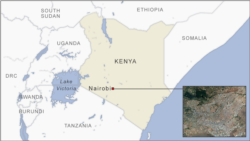Thirty-two-year-old Ibrahim Mmudi was already struggling to meet the daily needs of his wife, who was battling Stage 4 cancer, and three children when the coronavirus hit Kenya.
But life in Nairobi's Kibera neighborhood, Africa's largest urban slum, turned to survival as work came to a halt for daily wage earners and drivers like Mmudi.
In a sign of growing desperation, a stampede broke out as Kibera residents rushed for packages of food at a donation event earlier this month. In the chaos, two women — one of them pregnant — suffocated.
Kenya's government responded by banning uncoordinated food donations.
As Mmudi prayed for a miracle, 38-year-old Moses Tito Omondi was in Kibera looking for a way to help.
"A thought came into my mind, 'How do I act without interfering with the directives of the government?'" Omondi said. "Then the idea of linking the people who are able to provide to a family came to mind and immediately I reached out to my former university mates, and local friends. One of them gave me a voucher, another brought food, and Adopt a Family started picking up."
In less than a month, Omondi's Adopt a Family program connected 169 well-off Kenyan families with families in the slum.
Nairobi-based DJ Shem Nganga, a father of one, reached out to Ibrahim Mmudi's family.
"So, I talked to Moses and he connected me with Ibrahim," Nganga said. "I talked to Ibrahim and he told me about his family."
Nganga began sending Mmudi and his family the equivalent of $200 U.S. dollars per week so they could buy groceries and pay the bills, including for his wife's medical care.
Mmudi's wife succumbed to cancer earlier this week.
Nganga and some friends got together to contribute to funeral arrangements.
Mmudi says he is grateful for a man he considers part of his family, even though they have never met face-to-face.
"I have been jobless for so long and I have been going through a lot," he said. "It is a relief — to find someone who will help you with just 1,000 shillings ($10) is a milestone in this hardship. So, it is very helpful for all families that are less fortunate."
Kenya's government plans to pilot a cash transfer program to help the most vulnerable people buy food during the coronavirus pandemic.
Daystar University sociologist Kenneth Ongaro says he is skeptical that all the funding will reach those who need it.
"Having a social protection unit or policy is one, implementing it is the other," he said. "The question here is the gap, issues of dishonesty; we have people who have no morals, we have people who have integrity issues and, therefore, having the policies is one and implementing, adhering to it and executing is another."
Ongaro says direct support charities like Adopt a Family cut out intermediaries who might try to profit from the coronavirus programs.
But to make a big impact, he notes, they need a great deal more of Kenya's well-off families to help out the many other families in need.






